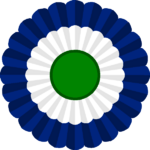Royal Assembly of Albeinland
Royal Assembly of the Kingdom of Albeinland | |
|---|---|
 | |
| Type | |
| Type | |
| Leadership | |
| Structure | |
| Seats | 160 AMs |
 | |
Political groups | HM Government (89)
HM Opposition (58)
Other opposition (13)
|
| Elections | |
| Party-list proportional representation | |
Last election | 12 November 2018 |
| Meeting place | |
 | |
| Orwell House, Castelby | |
| Website | |
| www.royalassembly.gov.ab | |
 |
|---|
| This article is part of a series on the politics and government of Albeinland |
|
|
The Royal Assembly of the Kingdom of Albeinland, commonly known as the Royal Assembly, Albish Parliament, Albish Assembly or Parliament, is the supreme legislative body of Albeinland and its overseas territories, possessing superiority over all Albish local authorities and town councils. According to the Common Charter, the Royal Assembly is a unicameral legislature consisting of 160 Assembly Members (AMs) elected under a party-list proportional representation system to a unlimited term of office (At Her Majesty's Pleasure) with the role of represent its constituency on the national political sphere until the next Assembly's dissolution. The Parliament meets in the Orwell House on the Luffton ward in Castelby.
It's the duty of the Royal Assembly to approve laws and supervises the work of the Chancellor and its Cabinet, as well as adopt the national budget every year and approve state costs. Although having its own independence from the Albish Crown and other government branches, the Albish Sovereign still exerts a considerable amount of influence while acting as supervisor of the current political system to avoid irregularities. The Queen manages several parliamentary occasions such as the State Opening of the Parliament.
The origins of the Royal Assembly begins in the Middle Ages with the creation of the King's Advisory Council (or King's Council) in the 14th century. Although being a mere advisory body, the King's Council started to increase its power and influence over the years, managing to even rule the country in cases of absence of the monarch or regency. This caused several clashes between the council and the monarchy which led to the Albish Revolution between absolutists and constitutionalists in 1663. After the end of the war in 1665 and consequently the constitutionalist victory, many saw the necessity of reforming the old King's Council to an independent parliamentary body, culminating in the creation of the Royal Assembly in the same year. Through the years, the Royal Assembly faced diverse reforms regarding AMs' numbers and its internal working system, with the most recent one being the Electoral Reform Act of 1987.
Since the last election on 12 November 2018, the HM's Government headed by Conservative Party of Vincent Lloyd alongside the Albish Nationalist League has the majority of the Royal Assembly, while the Social Democratic Party, Green Alliance and Radicals comprises the official opposition. Currently, the Liberal Party is a crossbencher party. The next parliamentary elections are going to occur in 2026. The current Speaker of the House is Richard Barrow from the Conservative Party.
History
Before the creation of the Royal Assembly in 1665, Albeinland already had several parliamentary bodies and councils during the Middle Ages, with its influence over the court varying over the time. In the Albish Unification Wars, the then King of Anglea Richard II created in 986 the Baron's Council - a council of 16 barons and clergy with the responsibility of managing the kingdom in cases of his absence in wars and other conflicts, becoming the first parliament in Albish history. After the unification of Albeinland by the Alban League, the Baron's Council became useless, with private advisors of the monarch exerting its role. This situation would last for almost 400 years when the Baron's Council and the sovereign private advisors united themselves to form the King's Advisory Council, commonly known as the King's Council in 1378.
At first, the King's Council had 25 members - 15 nobles appointed by the monarch; 5 knights-of-the-shire elected under a censitary voting system and 5 clerics appointed by the church. After the growth of Albish cities during the Renaissance, the bourgeoisie would start to be represented in the King's Council too, sitting next to the knights-of-the-shire. In its first years, the King's Council acted as a mere advisory body asked by the king only in times of crisis or war. However, due to the increase of Albish cities and farms as well as the gradual decline of the feudal monarchy, the King's Council would start to manage more important roles such as verify the general maintenance of the kingdom and take care of the treasury.
The increasing of the King's Council led to the first conflicts in 1587, when the numbers of advisors are too high and, without any central figure to organize the council, many started to compete against themselves for total control of the body. The conflict would end a year later with Arthur III creating the office of First Lord Advisor, whose duty was to lead and organize the council members and represent such in the courts. With the creation of the office, the King's Council influence over Albeinland started to grow, given the fact that the First Lord Advisor generally was an influential noble. At the start of the 17th century, the power of the King's Council starts to annoy the absolutist aristocracy, which would lead to a division between the council members into two groups: the Oxfords, who believed in a constitutional monarchy and the Cavaliers, who wanted to maintain the absolutist system.
Role
Legislative functions
Judicial functions
Parliamentary questions
State Opening of the Parliament
Members and elections
Qualifications
Officers
Commitess
Broadcasting media
Albish parliamentary debates can be viewed through ABS Parliament, a television channel from the Albish Broadcasting Service created in 1991 to accomplish and report the Royal Assembly's activities daily.
